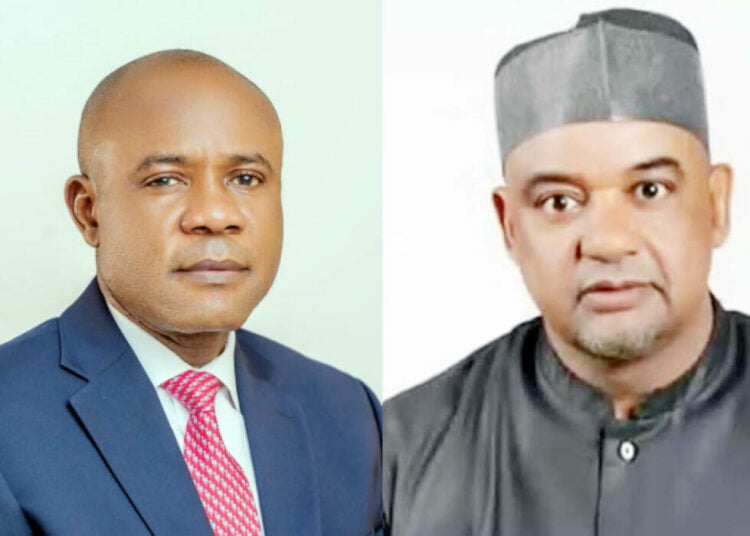For more than two decades, the Peoples Democratic Party(PDP) held a firm grip of the South East, dictating who gets what and when in the geo-political zone.
For the better part of that period, PDP, as ruling party at the center, produced Senate presidents, governors, ministers and other highly elevated non-elective positions.
Although the party continued to dominate the region even in the early years after it lost power at the center in 2015, it wasn’t the same.
After the 2015 general elections aggrieved members began to defect to other political platforms, weakening the party’s foundation in the zone.
But with the recent defection of its hitherto only serving governor in the region, Peter Mbah of Enugu State, the party has lost its one more form grip of the region, analysts opine.
A party once in total control…
Top politicians from the South East, especially former late Vice President Alex Ekwueme, were among key founders of the PDP in 1998.
As such from 1999 when democratic rule returned, the PDP made strong inroads in the region winning all the five states in the South East, namely, Enugu, Abia, Ebonyi, Anambra and Abia.
These states consistently voted for the party until the political landscape began to change.
It started in Anambra State when the All Progressive Grand Alliance (APGA) under former Governor Peter Obi, defeated the PDP in 2006.
PDP in the state had been dogged with internal wranglings between the then governor, Chris Ngige and Chris Uba.
This was the first state to pull out of PDP’s control and has remained with APGA ever since, thanks to the sentimental appeal it has for the late Igbo hero, Dim Odumegwu Ojukwu.
Nevertheless, while APGA held sway in the state, PDP still pulled strong numbers during general elections.
For instance, in 2019, Anambra delivered more votes for PDP than many southern states, despite the fact that the state was not under PDP’s governorship.
Also, there were periods when PDP won legislative seats (Senatorial, House of Reps, State Assembly) in Anambra during and after Obi’s tenure.
Next was Imo and Abia states in 2007 but they were short-lived then. Ikedi Ohakim and Senator Theodore Orji, won the Imo and Abia governorship election, respectively, in 2007.
They won on the platform of Progressives Peoples Alliance (PPA), owned by Senator Orji Uzor Kalu, a former PDP governor of Abia.
But internal wranglings and alleged overbearing influence of the party owner forced Ohakim and Orji to dump PPA and return to PDP, where they belonged to ab initio.
Still, while under PPA control PDP still maintained its dominance in the states, winning almost all other elective positions.
PDP lost Imo to APGA in the 2011 election. Rochas Okorocha emerged governor on the platform of APGA.
He subsequently joined the 2013 opposition merger arrangement which brought the All Progressives Congress (APC) into the region for the first time.
The state has remained under APC control, despite a brief stint in 2019 when PDP won with Emeka Ihedioha, but was reclaimed through the courts by the incumbent Senator Hope Uzodimma. Still PDP continued to win most national elections in the state.
In Ebonyi State, the PDP continued to hold sway until around 2022 when former Governor David Umahi, elected under the PDP defected to the APC.
Although he cited marginalisation of the South East region by the party, close followers of political happenings in Ebonyi State attributed his exit to the dwindling fortunes of the PDP.
Expectedly, many members of the State House of Assembly followed him to APC, a development that significantly weakened the PDP in the state.
As a result, the PDP lost the governorship election in the state in 2023 and many of its National Assembly seats.
The Obi tsunami
In the run up to the 2023 election, former governor Obi, who had run as Vice Presidential candidate in 2019 to Atiku Abubakar of PDP, broke away from the party and picked the Labour Party presidential ticket.
He had argued that it was the turn of the South and particularly the South East to produce the next president.
In the election, despite PDP’s hold of two states (Abia, Enugu) and APC’s control of two states (Ebonyi and Imo) while APGA controlled Anambra, Obi’s Labour Party swept more than 90 percent of presidential election votes. It also got many federal legislative seats across the region.
While the party’s victory in Enugu State was subject to legal tussle which was eventually won by PDP’s Mbah, the Labour Party was able to win Abia State with Alex Otti, ending the 24 -year dominance of the party in the state.
As a result, many PDP leaders, including lawmakers and local government heads, defected to the APC and Labour Party.
PDP’s dominance in the South East was terribly depleted after the 2023 election, as it controlled just one state, Enugu State, until its governor defected last week.
Enter Mbah’s move to APC
PDP’s woes in the South East was compounded by a refusal of party leaders at the national level to replace the party’s national secretary, Samuel Anyanwu.
Party leaders from the region, led by the Governor Mbah, had rejected Anyanwu who had gone to contest the governorship election in Imo and returned to reclaim the national scribe spot.
The party leaders had unanimously opposed his return and nominated Hon Sunday Ude-Okoye, as his replacement.
The issue became a legal tussle of which party leaders won at High and Appeal Courts, the verdict of the Supreme Court, which asked the party to take charge of its affairs, reopened the tussle.
Interestingly, party governors and the party’s Board of Trustees which had backed Ude-Okoye, changed as they conceded to the status quo with Anyanwu.
Prior to his defection of Governor Mbah to the APC, the Southeast Zonal Executive Committee (ZEC) of the PDP had declared that unless their nominee, Udeh-Okoye was confirmed as the PDP national secretary, they will be forced to reconsider their membership of the party.
The zone claimed that it had repeatedly nominated Udeh-Okoye over a long period (meetings in October 2023, February 2024, Jan 2025) and that other zones have not faced this delay or resistance in filling national positions.
They also pointed to a Supreme Court ruling (March 21, 2025) which held that internal party leadership issues are internal affairs and not for courts or INEC.
The zone felt that they have been repeatedly ignored or sidelined in favor of other zones, despite their loyalty and contributions and believed that since the position was zoned to South-East, it should be honored, adding that they see the position as rightfully theirs.
While it became clear that the national leadership won’t bulge, Mbah and other party leaders in the state dumped the party.
Mbah officially moved to the APC last Tuesday, saying he took the decision to get a platform that will serve his people optimally.
He made the announcement during a live broadcast at the Government House, Enugu.
The governor maintained that the move was not a betrayal, stressing that he wanted to move to a platform that will serve his people optimally.
The number one citizen of Enugu State emphasised that over decades, the South East, especially Enugu, has stood firmly behind the PDP, showing loyalty and patience.
He, however, expressed dismay that despite this history, their voices were too often disregarded when it mattered most.
Present during the declaration were former governors of Enugu State, Sullivan Chime, and Ifeanyi Ugwuanyi, among other dignitaries.
Members of the National leadership of the APC have already issued him a membership card of the APC.
Mbah stressed that they are carrying his people’s trust to a platform that will serve them best.
He averred that when a system no longer delivers fairness to them, then a bold decision should be taken.
The governor further explained that the decision was a collective move by the political family in Enugu state, comprising members of the National Assembly, members of the State House of Assembly, the State Executive Council, all the local government chairmen, all councilors, all political appointees, and over 80% of party executives.
He noted that over the past months, he thought carefully about the path forward, adding that after much soul searching and discussion, he concluded that they must stand for the principles and institutions that honour, transparency, trust, and above all, the people they serve.
“We are not moving from a place of resentment or fear. We are confident of our future. We have no act to grind, no personal points to make, but fairness and respect and integrity must guide our choices for that future to be ours today,” he stated.
The governor further disclosed that he has found in President Bola Tinubu a leader of the nation and a partner in purpose, “a man with the courage to look beyond today and make the tough choices that secure lasting prosperity for tomorrow.”
He said together, they share a vision and a conviction that transformation must be bold and disruptive, that roads, railways, and airlines must stretch out of the heart of the South East.
Speaking at the official declaration ceremony, Vice President, Kashim Shettima, declared that Mbah’s defection to APC showed that the energy by Governor Hope Uzodimma and Governor Francis Nwifuru, has yielded fruit by bringing Ndigbo to the mainstream of Nigerian politics.
The vice President stated that Ndigbo have been in the margin of politics in Nigeria even though they are one of the most vibrant people on the continent of Africa.
What next?
The fate of PDP in the South East remains unpredictable. While some analysts argue the party has stretched its luck too far this time around, some of its loyalists believe the party can bounce back.
Commenting on the dwindling fortune of the PDP in the South, the founding national chairman of APGA, Chekwas Okorie, described the PDP as a big disappointment to Ndigbo.
He told LEADERSHIP Weekend that it was unfortunate that despite the loyalty and support that the people of the South East gave to the PDP for so many years, there was no federal presence in the zone.
He said during the election that produced Olusegun Obasanjo as president, PDP produced all the five governors of the South East and members of the National Assembly, among others.
Okorie said though the party gave some Igbo persons appointments, the appointments did not transform the lives of people of the zone.
It started in Anambra State when the All Progressive Grand Alliance (APGA) under former Governor Peter Obi, defeated the PDP in 2006.
PDP in the state had been dogged with internal wranglings between the then governor, Chris Ngige and Chris Uba
He therefore wondered what any person from the South East is still doing in the PDP which he maintained could not usher in federal presence in the zone despite the massive support it got.
However, a former national auditor of the PDP, Barrister Ray Nnaji, told LEADERSHIP Weekend that the PDP is not dead in the South East.
He said the party will go back to the drawing board to know the people that are with them and those who are not with them.
On his part, a former chairman of the Inter-Party Advisory Council (IPAC) in Enugu State, Barrister John Nwobodo, said the PDP is going through a rebirth phase in the South East.
Nwobodo, who spoke with LEADERSHIP Weekend, insisted that the PDP is not dead in Enugu State, alleging that those who held the party down in the zone were the people leaving the party.
“PDP is not dead in the Southeast, it is going through a rebirth phase and this phase is going to make it stronger”.
He emphasized that the rebirth process will make the PDP reclaim its dominance in the South East soon.
Nwobodo, a former governorship candidate in Enugu State, said the ongoing movement of some PDP members to other parties has in no way affected the fortunes of the party in the Southeast.
He assured that the replacement of those that left the party will soon be made, adding in days to come, people will see a PDP that will be stronger to reclaim its lost position in the Southeast.
“The recent defections of politicians from the PDP has in no way affected the fortunes of the party, PDP is still a party to reckon with
“The rebuilding and repositioning efforts have started in earnest” he stated.
Former PDP chieftain, Professor Damian Opata, said that the party may go dormant soon.
Opata, a former lecturer at the University of Nigeria Nsukka (UNN), noted the APC is having a good cycle and commended those that decided to move to the APC.
He insisted that there was nothing wrong in people moving to other platforms where they feel that they can stay and win elections.
He therefore insisted that people defect to other parties to win election.
He noted that the PDP was once dominant, stating that this is the time for the APC to excel.
Opata insisted that the PDP “may go dormant in the coming years” just as he said he will also move to the APC in coming days.
Meanwhile, checks by LEADERSHIP Weekend revealed that the PDP is still alive in Enugu.
Some members of the PDP, who spoke on condition of anonymity, said they will reorganise the structure of the party and fill the vacant position for further elections.
As future mass defection of PDP members is still being awaited, political pundits believe that the future of the once admired party in the South East now hangs in the balance.
The coming election cycles will determine whether the party can stage a comeback or fade permanently into political oblivion.





